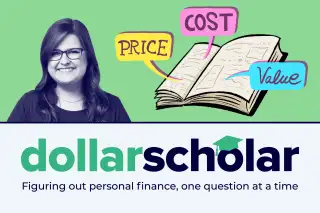Dollar Scholar Asks: What's the Difference Between Cost and Price, and Does It Even Matter?

This is an excerpt from Dollar Scholar, the Money newsletter where managing editor Julia Glum teaches you the modern money lessons you NEED to know. Don't miss the next issue! Sign up at money.com/subscribe and join our community of 160,000+ Scholars.
I went through a phase as a teen (as one does) in which I was obsessed with inappropriate quotation marks (as none does). I giggled every time I saw a restaurant sign proclaiming "we are 'happy' to serve you" or "no 'chicken' available today." I became a regular on r/suspiciousquotes. In typical 2008 fashion, I even maintained a Facebook album of my favorites.
At a young age, I realized that punctuation has power. Words do, too — there's a reason, after all, people say the pen is mightier than the sword.
I always try to be precise in what I say, but I had a wake-up call recently when, amid the chatter about President Donald Trump's tariffs and their impact on everyday Americans' budgets, I realized I've been throwing around the words "price" and "cost" indiscriminately. That's not very Scholarly of me.
Let's drill down.
What's the difference between cost and price? Does it matter which word I use?
I called David Mayer, author of the book Economics in Plain English, to parse the terms. He tells me costs generally fall upon a supplier, seller or producer and include resources like labor costs, raw materials, buildings and machines.
The word cost dates back to Old French and the Middle English period of the 1300s. Price also comes from Old French, but it refers to the dollar amount a person pays for a good or service. It's "an agreed-upon amount paid by a consumer, received by a producer," respectively, Mayer says.
My confusion is understandable. Cost and price are so intertwined that, in some cases, which word is correct to use is simply a matter of perspective.
Take an employee's wage, for instance. The wage can be both a price (for a unit of work) and a cost (to an employer).
Another example, courtesy of Mayer: Imagine I'm at a car dealership. If I ask, "What is the price of that car?" what I really want to know is "What dollar amount can I pay to have that car come home with me?" If I were to ask about the cost, I'd technically be asking what the dealer had to pay behind the scenes in order to acquire that car, turn around and sell it to me.
Prices often reflect costs, but they're not 1:1, since businesses tend to make their prices exceed their costs in order to generate a profit margin.
"The words are used interchangeably all the time," Mayer adds. "If you were to ask me how much something costs, it would be rude of me to say, 'Actually, you're asking what price did you pay?'"
In everyday life, which word I choose to talk about my purchases doesn't really matter. But then there's a wild card: value.
Adam Davis, Capital One's vice president of financial health and customer liquidity, tells me in an email that value — the monetary worth of an item — is subjective, whereas price and cost tend to be objective.
To determine value, Davis says I should ask myself three questions:
- How much does this mean to me? A whole host of individualized factors can influence how important a good or service is to me.
- Is this something that will appreciate (or depreciate)? Some items — think: works of art, homes, stocks — can increase (or decrease) in value over time.
- Can I find this item at a lower price elsewhere? Being able to purchase something on sale can create more value for a consumer like me.
To untangle these terms, I like to think about my copy of the Jonas Brothers' first album.
It probably cost the manufacturer between $1 and $2.50 to make. I paid a price of $15 back in 2006 to purchase it. Because it has appreciated over time and I have beloved memories of getting it autographed at my first Jonas Brothers concert, I value that CD a whole lot more than $15.
While some people are selling their signed copies of It's About Time on eBay for $215 — and others are buying them at that price — I probably wouldn't give up mine for that amount.
See what I mean about subjectivity?
"When making a purchasing decision, it’s important to consider all three [cost, price and value]," Davis adds. "A common mistake consumers make when evaluating a purchase [is] conflating personal value with price."
The bottom line
Broadly speaking, cost is the amount of money needed to produce something, while price is the amount of money a person pays for it. Although the terms are largely fine to mix and match, I should be careful when bringing value — the amount of money something is worth — into the conversation.
These may be basic terms, but the way they blend and impact my shopping decisions matters.
More from Money:
Is It a Good Idea to Put My Bills on Autopay?